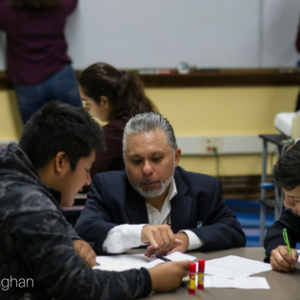Ray Salazar has been an English teacher in the Chicago Public Schools since 1995. He is a National Board Certified Teacher. His blog, The White Rhino, tied for second place in EWA's Community Members Best Blog category in 2012. National Public Radio and Chicago Public Radio aired his essays and the Chicago Tribune and CNN's Schools of Thought Blog published his editorials. Salazar earned a bachelor's degree in English/Secondary Education and master's degree in writing, with distinction, from DePaul University. Visit his blog The White Rhino at www.chicagonow.com/white-rhino Follow him on Twitter @WhiteRhinoRay Contact: WhiteRhinoBlog@gmail.com
We need to change our high-school students’ expectations about teacher feedback
January 7, 2020
At the beginning of the year, my Chicago Public Schools high-school students expressed lots of frustration because I didn’t write any comments on their first major essay. “You need to give us feedback,” they demanded. Some doubted I read their essays because I didn’t make a mark. I explained that one of my goals as a teacher has become to build my students’ independence, thus fighting against the image of students stretching out their hands like fans at a rock concert, fluttering their paper for the teacher’s attention. I also fight against the ugly co-dependence that arises when teachers feel…
Read MoreWhy I Still Give My Students Zeros
April 4, 2019
Above: My journalism student finally turned in his editorial. I didn’t lose anything by letting him turn it in late. This was an accomplishment for him and–even though it was almost a month late–he felt proud of himself. A couple of months ago, a high school senior taking graduation photos came up to me in the hallway and desperately asked, “Can you tie my tie?” I answered, “Nope. But I can teach you how.” “But the photographer is waiting,” he responded. I said, “Then you better learn fast.” One of the disappointing changes I’ve seen in my 23-year career in…
Read MoreHow to Save a Class Discussion That’s Dying
May 22, 2018
Effective whole-class discussions are part thoughtful planning and part luck. Sometimes an instructional approach works so well that we expect the same results the next time we use it. And sometimes, that works out. Other times, we wonder, “What the heck happened?” I thought I had found another consistent way to engage as many of my students as possible in whole-class discussions. It worked really well last week. But this week, I got crickets. Last week, we listened to a podcast about the concept of success – This American Life’s “Three Miles.” Students annotated, reflected, and shared in small groups. I…
Read MoreFive Insights from Running a School Newspaper
January 30, 2018
School newspapers can be daunting, frightening ideas for teachers and administrators. Adults fear irresponsible reporting that proves to be gossip about the school, a staff member, or student. Or there’s the fear that some piece of news in the school paper will catch the attention of the mainstream news media and vans of reporters and cameras will bombard the school. Or there’s a fear that the poor quality of writing will embarrass the school. With the decrease in newspaper readership across the country and limited budgets, it’s easy for schools to decide against continuing to publish a school paper. But…
Read MoreFour Questions Teacher Leaders Must Ask Themselves
August 24, 2017
Last year Teach to Lead invited me to give the keynote speech at the summit on inclusion, equity, and opportunity. A partnership between, National Board, ASCD, and the U.S. Department of Education, Teach to Lead hosts Teacher Leadership Summits to help spotlight and advance the groundbreaking, teacher-led work that is happening in states, districts, and schools across the country. The teams from numerous parts of this country reminded me—as I’ve been reminded every year since I started teaching twenty-one years ago—that there is one universal truth that must always guide us: there are no simple solutions. But there are solutions. And…
Read MoreHow to Help Teens Deal with the Challenges of Male and Female Gender Expectations
March 8, 2017
Through our teaching, socially conscious teachers aim to create learning environments that help students see themselves as change agents, if not in their society, at least in their own lives. Twenty-one years ago when I started teaching, I could simply say, “I teach.” But in the last few years, I’ve found that describing what I do is much more complex. In addition to the academic part of teaching, I find that I am helping students deal with social-emotional issues regularly. Too often, I learn about a student’s struggles with mental health. I learn about students who harmed themselves. I learn…
Read MoreWhy More High Schools Should Have a Block Schedule
November 3, 2016
When I started teaching in 1995 at an alternative high school in Chicago (a school that gave dropouts a second chance at a diploma), we were on a block schedule. I saw students every other day for about 90 minutes a class. I hated it. As a new teacher then, I found it difficult to plan to engage students that long. And this is the era when we still had VCRs—I was still buying music on cassettes—so showing a video clip to add some variety or depth was complicated. I had to go to Blockbuster and pray they had the…
Read MoreListening to Students’ Voices through Audio Essays
August 16, 2016
I aim to teach my Chicago high-school students that writing is not always about the writing. Yes, the ideas, the sentence structure, the connotations matter. But sometimes, the process before the writing or after matters more. I start every year with a challenging non-fiction narrative unit that pushes students to focus on one key event in their lives—something that led to a shift in their habits of mind. I want it to be more than a personal essay, I tell them. “I want it to be something that matters to more people than you,” I explain. One of the texts…
Read MoreWhy More Teachers Should Use Podcasts
May 13, 2016
When we started the third of four quarters in February, I gave up on getting my students to read outside of class. Despite the fact that the approaching ACT and an AP English Language test were a couple months away, I said, “No more reading Atlantic articles for homework. Now,” I told them, “I need you to listen.” So every week, I’ve been assigning podcasts from NPR’s the Hidden Brain. The homework completion rate? Almost 100%. Podcasts continue to gain popularity. But I didn’t give this assignment to join the bandwagon. I did it because of the thought-provoking experiences I…
Read MoreWhen We See Ourselves in Our Students
September 8, 2015
Editor’s Note: Ray Salazar, NBCT, teaches high school English in Chicago Public Schools and is an award-winning blogger. The views expressed in this blog are his own. I admit it: I have favorite students. While I look out for all my students and work to build strong professional relationships around writing with all of them, there are always students I look out for a little more. It’s not usually the outspoken, charismatic, or high-achieving young people who become my favorites. Instead, I end up admiring the students who speak up only occasionally or rarely, who express their writing frustrations honestly,…
Read More

